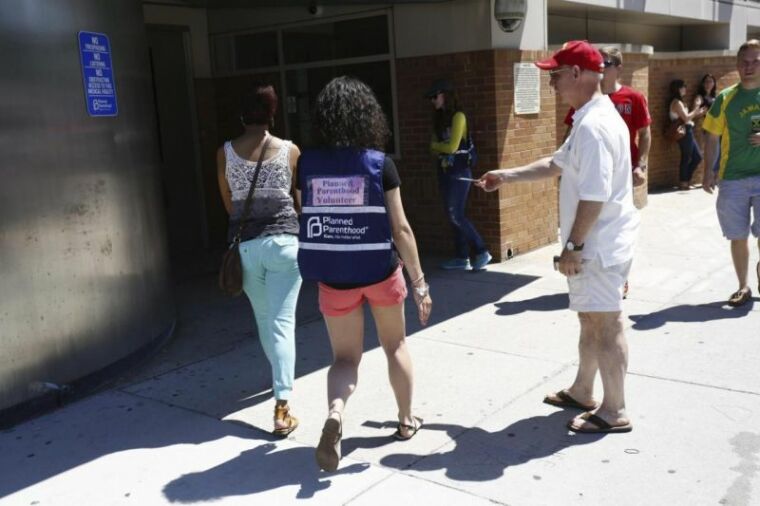New Jersey court nixes abortion buffer zone law in Englewood

A New Jersey federal court has struck down an ordinance prohibiting pro-life speech within eight feet of abortion clinics in the city of Englewood.
According to NorthJersey.com, the ordinance, passed by the City Council in March 2014, prohibits people from coming within 8 feet of the entrance, exit or driveway of a health care facility or "transitional facility," such as a shelter for domestic-violence victims.
The mandate was passed in an attempt to address the protests outside abortion clinics, where officials and activists said at the time had escalated from quiet vigils to confrontations on the sidewalk.
In 2015, pro-life advocate Jeryl Turco had filed the lawsuit challenging the buffer zones, arguing that the ordinance violated the First Amendment as well as the state constitution.
Turco, who used to make weekly visits to Metropolitan Medical Associates, also contended that the law created a double standard between protesters and the volunteers who are able to use restricted parts of the sidewalk while accompanying patients to and from the clinic.
Last week, U.S. District Judge Susan D. Wigenton ruled that the measure violates the rights of pro-life protesters to free speech and free assembly under the First Amendment.
Wigenton stated in her decision that the ordinance was too broad, noting that the defendant "did not create a targeted statute to address the specific issue of congestion or militant and aggressive protesters outside of the clinic."
"Instead, defendant created a sweeping regulation that burdens the free speech of individuals, not just in front of the clinic, but at health care and transitional facilities citywide," the judge wrote.
Bonnie Shapiro, the president of the Northern New Jersey National Organization for Women, expressed disappointment with the ruling.
"We were so overjoyed when the council understood what this meant for the patients, and we feel this is really just a sad result," she said.
"The buffer helped because people's personal space was not infringed upon in the same way. The yelling was at least not in their face. A person couldn't pull them aside, which is so invasive," she added.
Pro-life protesters had been accused of shouting, pushing people and blocking entrances to clinics, but Marie Tasy of New Jersey Right to Life contended that the allegations were "not true."
Tasy pointed out that the court has found no evidence of any violence, clinic harassment, or arrests in the last five years.
Wigenton cited a June 2014 U.S. Supreme Court decision, which struck down a Massachusetts law that prohibited protesters from coming within 35 feet of an abortion facility. The high court stated in its ruling that the law limited free speech more than what was necessary in an effort to further the state's interests in maintaining order and ensuring access to abortion clinics.
The judge further stated that the city had not tried less restrictive measures before enacting the ordinance, adding that no individuals were prosecuted for their actions outside the clinic in the five years before the measure was passed.
 Christians don't have to affirm transgenderism, but they can’t express that view at work: tribunal
Christians don't have to affirm transgenderism, but they can’t express that view at work: tribunal Archaeology discovery: Medieval Christian prayer beads found on Holy Island
Archaeology discovery: Medieval Christian prayer beads found on Holy Island Presbyterian Church in America votes to leave National Association of Evangelicals
Presbyterian Church in America votes to leave National Association of Evangelicals Over 50 killed in 'vile and satanic' attack at Nigerian church on Pentecost Sunday
Over 50 killed in 'vile and satanic' attack at Nigerian church on Pentecost Sunday Ukrainian Orthodox Church severs ties with Moscow over Patriarch Kirill's support for Putin's war
Ukrainian Orthodox Church severs ties with Moscow over Patriarch Kirill's support for Putin's war Islamic State kills 20 Nigerian Christians as revenge for US airstrike
Islamic State kills 20 Nigerian Christians as revenge for US airstrike Man who served 33 years in prison for murder leads inmates to Christ
Man who served 33 years in prison for murder leads inmates to Christ


 Nigerian student beaten to death, body burned over ‘blasphemous’ WhatsApp message
Nigerian student beaten to death, body burned over ‘blasphemous’ WhatsApp message 'A new low': World reacts after Hong Kong arrests 90-year-old Cardinal Joseph Zen
'A new low': World reacts after Hong Kong arrests 90-year-old Cardinal Joseph Zen Iran sentences Christian man to 10 years in prison for hosting house church worship gathering
Iran sentences Christian man to 10 years in prison for hosting house church worship gathering French Guyana: Pastor shot dead, church set on fire after meeting delegation of Evangelicals
French Guyana: Pastor shot dead, church set on fire after meeting delegation of Evangelicals ‘Talking Jesus’ report finds only 6% of UK adults identify as practicing Christians
‘Talking Jesus’ report finds only 6% of UK adults identify as practicing Christians Mission Eurasia ministry center blown up in Ukraine, hundreds of Bibles destroyed: 'God will provide'
Mission Eurasia ministry center blown up in Ukraine, hundreds of Bibles destroyed: 'God will provide' Church holds service for first time after ISIS desecrated it 8 years ago
Church holds service for first time after ISIS desecrated it 8 years ago Burger King apologizes for 'offensive campaign' using Jesus' words at the Last Supper
Burger King apologizes for 'offensive campaign' using Jesus' words at the Last Supper Uganda: Muslims abduct teacher, burn him inside mosque for praying in Christ’s name
Uganda: Muslims abduct teacher, burn him inside mosque for praying in Christ’s name